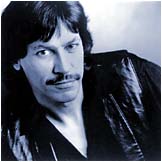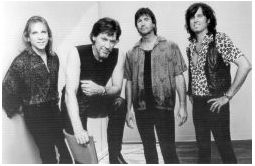 In the chaotic world of rock ‘n’ roll, in which the lifespan of most bands can be measured in terms of a few years or a few months, John Kay and Steppenwolf have emerged as one of rock’s most enduring and respected bands, delivering hard-hitting, personally-charged music for more than three decades.
In the chaotic world of rock ‘n’ roll, in which the lifespan of most bands can be measured in terms of a few years or a few months, John Kay and Steppenwolf have emerged as one of rock’s most enduring and respected bands, delivering hard-hitting, personally-charged music for more than three decades.
In the late 1960s, Steppenwolf embodied that era’s social, political and philosophical restlessness, building an impressive body of edgy, uncompromising rock ‘n’ roll that retains its emotional resonance more than 3 decades after the band’s formation.
Such Steppenwolf standards as “Born to Be Wild,” “Magic Carpet Ride,” “Rock Me” and “Monster” stand amongst Rock’s most indelible anthems.
At last count, the band’s worldwide record sales exceed 25 million units. Its songs remain fixtures on classic-rock radio, and have been licensed for use in approximately 50 motion pictures and an even greater number of television programs. And, in addition to being the first band to use the term “heavy metal” in a song (in “Born to Be Wild”), Steppenwolf’s punchy style helped to establish the fundamentals of the hard rock sound that would flourish in the 1970s.
Along the way, various members came and went. “Steppenwolf was always kind of a work in progress,” says Kay. “By our second album, we had become more confident in not having to mimic others in our attitude, in our look or in our music. …”
Steppenwolf’s popularity and influence continued unabated into the early 1970s. But, the quintet officially disbanded on Valentine’s Day 1972, a day that L.A. Mayor Sam Yorty officially designated as “Steppenwolf Day.” Kay then released a pair of critically acclaimed solo albums, Forgotten Songs and Unsung Heroes and My Sportin’ Life, which found him exploring new musical and lyrical territory, with rewarding results.
Following Steppenwolf’s highly successful 1974 European “farewell” tour, Kay reformed the band with Jerry Edmonton, Goldy McJohn, George Biondo and new guitarist Bobby Cochran. The group recorded 3 more albums, Slow Flux, which yielded the Top 20 hit “Straight Shootin’ Woman”, Hour of the Wolf and Skullduggery, before calling it a day once again in 1976. Kay then signed with Mercury Records and relaunched his solo career with 1978’s All In Good Time.
It was around this time that John Kay and Steppenwolf co-founder, Jerry Edmonton (who by then had retired from music in favor of a career in photography), took steps to establish their legal claim to the band name.
 In 1980 Kay launched an all-new lineup, now billed as John Kay and Steppenwolf, spending the next several years working a punishing touring regimen. This period put Kay and company back in touch with a large and loyal fan base, as well as an influx of younger listeners responsive to band’s enduring appeal, that has kept Steppenwolf rolling ever since. Since then, John Kay and Steppenwolf, which now includes longtime members Michael Wilk on keyboards and bass; Ron Hurst on drums; and relatively recent addition Danny Johnson on guitar, have released 7 albums and maintained a busy international touring schedule that keeps the band on the road for several months per year. The band also hosts Wolf Fest, an annual weekend-long festival that draws fans from around the world – fondly dubbed “the Wolfpack”- to the band’s adopted home base in Tennessee.
In 1980 Kay launched an all-new lineup, now billed as John Kay and Steppenwolf, spending the next several years working a punishing touring regimen. This period put Kay and company back in touch with a large and loyal fan base, as well as an influx of younger listeners responsive to band’s enduring appeal, that has kept Steppenwolf rolling ever since. Since then, John Kay and Steppenwolf, which now includes longtime members Michael Wilk on keyboards and bass; Ron Hurst on drums; and relatively recent addition Danny Johnson on guitar, have released 7 albums and maintained a busy international touring schedule that keeps the band on the road for several months per year. The band also hosts Wolf Fest, an annual weekend-long festival that draws fans from around the world – fondly dubbed “the Wolfpack”- to the band’s adopted home base in Tennessee.
In 1994, John Kay published his autobiography, Magic Carpet Ride, compellingly relating the ups and downs and his and his band’s history.
Today’s Steppenwolf continues to generate vital new music, with a number of recording projects in the works, including the recent John Kay solo effort, Heretics and Privateers.
“There’s a lot of truth in that old cliché about whatever doesn’t kill you making you stronger,” Kay concludes. “Looking back, I realize that it’s the struggles that have taught us how to gain our independence and live the rock ‘n’ roll of life on our own terms.”
